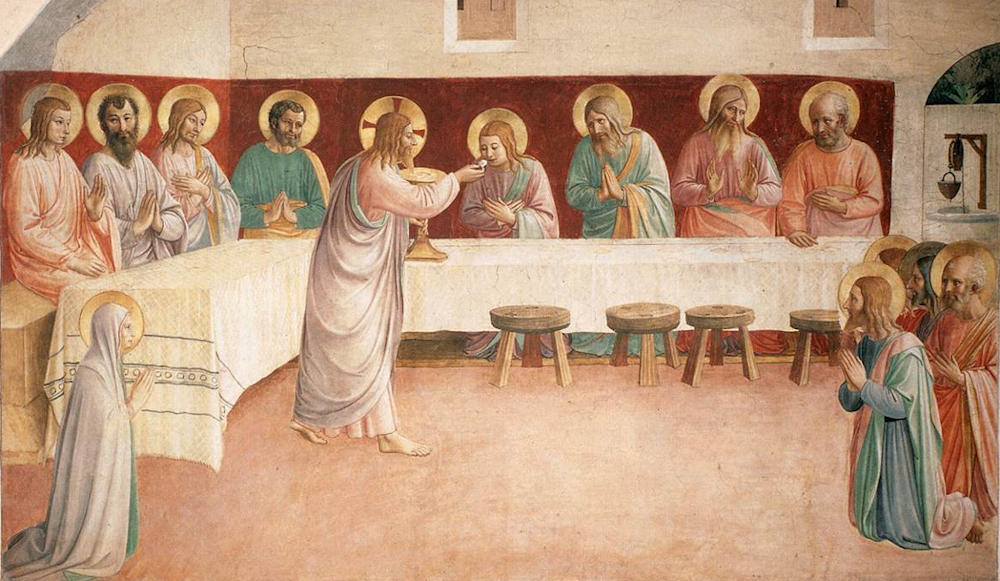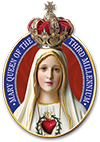
Christ our Saviour, being ready to leave this world and ascend to the Father, instituted in memory of His Death, shortly before His Passion, at the Last Supper, the supreme and magnificent Sacrament in which He gives us His Body as food and His Blood as drink.
He remained truly present among us.
Whenever we eat of this Bread and drink of this Chalice, we truly proclaim the Death of the Lord, for in instituting this Sacrament, Jesus said to the Apostles: “Do this in memory of Me” (1 Cor 11:24). Thus, He expressed His desire that this sublime and venerable Sacrament be for us a remembrance of the great love with which He loved us; an admirable and stupendous remembrance, sweet and suave, dear and precious, in which immutable prodigies and marvels are renewed. In it is found every delight and the most delicate savours. In it we taste the very sweetness of the Lord and, above all, we obtain strength for life and for our salvation.
In this most sweet, sacrosanct and salutary memorial, we renew our gratitude for our Redemption, we turn away from evil, we consolidate the practice of good, we progress in the acquisition of the virtues and of grace, we are comforted by the bodily presence of our Saviour; for in this sacramental commemoration, Christ is present among us, under a different form, but in His true substance.
For He said to the Apostles and His successors, before ascending into Heaven: “and lo, I am with you always, to the close of the age” (Mt 28:20), and He consoled them with the benevolent promise that they could even rely on His corporeal presence. […]
There is no better and nobler delicacy for the soul.
Thus, Our Saviour gave Himself to us as food so that, just as man was corrupted by the forbidden food, he would be renewed by a blessed food. Those who had fallen by the fruit of a tree of death, resurrect by the bread of life. From that tree hung a deadly food, in this bread one finds life-giving food; that fruit brought ill upon us, the other a cure; a disordered appetite produced evil, a salutary hunger, benefit; to the place pervaded with infirmity came the remedy; whence death was introduced, there came forth life.
Of that first food was said: “for in the day that you eat of it you shall die” (Gn 2:17); of the second was declared: “if any one eats of this bread, he will live for ever” (Jn 6:51).
It is food that truly restores and nourishes, satisfies entirely, not the body, but the heart; not the flesh, but the spirit; not the stomach, but the soul. Man needed a spiritual food, and our merciful Saviour gave him the choicest and noblest delicacy as food for his soul. […] This delicacy is eaten, but is neither consumed nor changed, for it is not transformed into who eats it, but, on the contrary, makes those who receive it worthily like unto itself.
Oh, sublime and adorable Sacrament, worthy to be celebrated with the most moving hymns of praise, exalted by the most intimate fibres of the soul, by the most ardent homage! Thou art worthy to be received by the purest souls! Glorious memorial, Thou should be sheltered in the deepest recesses of the heart, indelibly imprinted upon souls, enclosed in the innermost regions of the spirit, honoured with the most steadfast and ardent piety!
Let us always turn to this great Sacrament, so as to remember at every moment Him of whom it is the perfect memorial. For we more readily remember the person whose benefits we have constantly in mind.
The duty of honouring such an admirable Sacrament
Even though this holy Sacrament is celebrated every day in the solemn rite of the Mass, we believe it to be worthy and fitting to commemorate it at least once a year in a more solemn feast, so as to confound and refute the hostility of the heretics.
Now, on Holy Thursday, the day in which Christ instituted it, the Holy Church is concerned with the Confession of the faithful, the blessing of the Chrism, the fulfilment of the foot-washing mandate and many other sacred ceremonies.
She is therefore unable to give full attention to the celebration of this great Sacrament.
The Church honours the Saints, and though recalling them often throughout the year in the litanies, Masses and other liturgical acts, does not neglect to celebrate with greater solemnity the feast of their entrance into Heaven, and to establish fixed days dedicated to them, with special commemorations in their honour. And as perhaps on these feasts the faithful omit some of their duties due to negligence or many concerns, the Church reserved a day of the year for the commemoration of all the Saints, thereby to supply in this common celebration what may have been overlooked in the particular ones, whether due to negligence, worldly concerns or human fragility.
Now, this duty must especially be fulfilled with regard to the admirable Sacrament of the Body and Blood of Christ, glory and crown of all the Saints. May He shine in a special way in a solemn commemoration, so as to diligently supply what might have been neglected in the other celebrations of the Mass.
In this way the faithful, examining themselves attentively, with humility and purity of conscience, may make reparation for the faults they had committed in the attendance of Mass, perhaps by having their minds on worldly affairs or, more likely, due to negligence or human weakness.
Solemnly celebrate this sublime and glorious feast
So that the Catholic Faith may be reinforced and exalted, we believe it just and opportune to institute that every year be celebrated in the Church a special and solemn feast in honour of such a great Sacrament daily celebrated in the Church, and we establish as the date for this commemoration the first Thursday after the octave of Pentecost.
On this day, may devout multitudes of faithful gather in the churches, filled with love. May all the clergy and people intone jubilant hymns of praise, overflowing with joy from lips and hearts. Let faith be sung, hope
resound and charity overflow. Let devotion be manifest, purity rejoice and sincerity shine forth from hearts. May all unite with eager spirits and willing hearts to prepare for and celebrate this feast.
May fervour inflame the souls of the faithful in the service of Christ so that, by means of this feast and other good works, they may accumulate always greater merits in His sight, so that after this life they may attain as
a reward Him who offered Himself to men as food and as the price of their redemption.
We therefore recommend and exhort you in the Lord, and by means of this apostolic bull ordain, in virtue of holy obedience and for the remission of your sins, that you devoutly and solemnly celebrate this most sublime and glorious feast, and that you vigilantly strive to have it celebrated in the churches of your cities and dioceses on the aforementioned Thursday of each year, using the readings, responsories, verses, antiphons, psalms, hymns and prayers instituted for this purpose, which we annex to this bull along with the parts proper to the Mass.
We also ordain that, directly or by mediation of others, on the Sunday prior to the aforementioned Thursday, you exhort your faithful, by means of a good Confession, generous alms, fervent prayers and other works of piety and devotion, to prepare themselves, with God’s help, to reverently receive on this day such a precious Sacrament and thereby obtain an increase of grace.
Pope Urban IV. Excerpts from the Bull “Transiturus de hoc mundo”, 11/8/1264 .
Original Latin available at www.vatican.va
